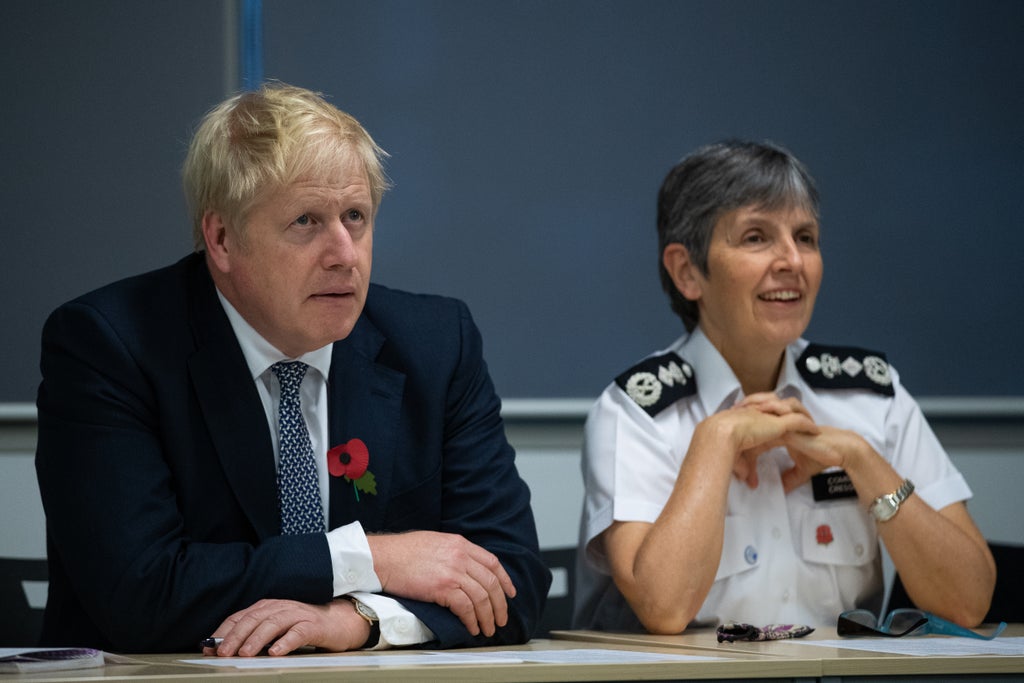
Politicians and civil servants who participated in alleged Downing Street parties could be handed significant fines if police conclude that they broke Covid laws.
The Metropolitan Police’s investigation is currently focused on whether various events broke the Health Protection Regulations that were in force at the time, and changed frequently through the pandemic.
Commissioner Dame Cressida Dick told the London Assembly that fixed penalty notices would not “necessarily be issued in every instance and to every person involved”.
She said that retrospective investigations for Covid breaches were only carried out for “the most serious and flagrant type of breach” where there was evidence and three criteria were met.
“My three factors were and are: there was evidence that those involved knew, or ought to have known that what they were doing was an offence, where not investigating would significantly undermine the legitimacy of the law, and where there was little ambiguity around the absence of any reasonable defence. In those cases, where those criteria were met, the guidelines suggested that we should potentially investigate further and end up giving people tickets.”
The announcement on Tuesday came after weeks of mounting pressure on the force to step in, as it maintained it would only investigate if it received evidence of potential criminal offences from Sue Gray’s inquiry.
Dame Cressida said the investigation was triggered “as a result firstly of information provided by the Cabinet Office inquiry team and secondly my officers’ own assessment”.
Scotland Yard said Ms Gray’s team had provided “outline findings” from its inquiry in recent days, and that it had formally requested all relevant evidence.
The Green Party is calling for the police investigation to look at charges of misconduct in public office, but Scotland Yard said it would not “speculate” on whether the probe could be broadened beyond Covid laws.
The offence is committed when a “public officer”, which includes MPs and ministers, “wilfully misconducts himself, to such a degree as to amount to an abuse of the public’s trust in the office holder without reasonable excuse or justification”.
Fines have been the main method of enforcing Covid laws throughout the pandemic, and were used as a “last resort”, according to police guidance, but people can be prosecuted for offences and handed larger penalties if they refuse to pay.
The Independent understands that any punishments for people found to have broken the law with Downing Street and Whitehall parties will be governed by the law that was in place at the time.
The default punishment during the alleged Number 10 garden gatherings in May 2020 was £100, but the government then increased penalties.
During a string of reported Whitehall and Downing Street events in November 2020, England was in the grip of a national lockdown that forbade gatherings of two or more people inside unless an exemption applied.
By then, the default fine for breaching the law had doubled to £200 and unprecedented £10,000 fines had been introduced for people responsible for organising large gatherings involving 30 or more attendees.
Covid laws changed as different “tiers” came into force in December 2020, when a series of alleged Christmas celebrations took place, but the same fine scheme was in place and large social gatherings were banned.
In April 2021, when two “boozy” leaving parties were reportedly held in Downing Street on the eve of Prince Philip’s funeral, indoor celebrations remained illegal.
Default fines were £200 for Covid offences, but a new £800 fine had been introduced for people attending parties of more than 15 people, and organisers of large gatherings could still be fined £10,000.
Announcing the new £800 fine in January 2021, Priti Patel had told a press conference they were necessary because there remained a “small minority that refuse to do the right thing”.
“To them my message is clear. If you don't follow rules then the police will enforce them,” she added.







